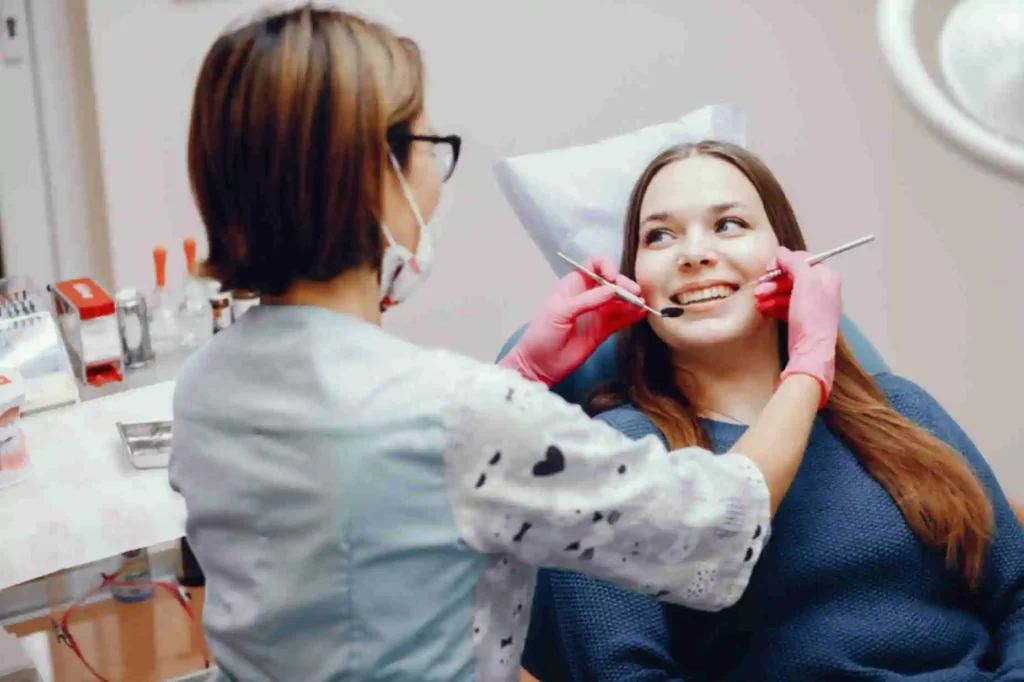Looking to get Gum Surgeries in katargam, SURAT
If you’re seeking advanced dental care in Katargam, Surat, look no further than Navadia Multyspeciality Dental Clinic. Led by Dr. Jatin Navadia, a specialist in implant, lasers, smile design, and various esthetic dental procedures, the clinic offers cutting-edge treatments tailored to your needs. From gum surgeries like gingivectomy and flap surgery to tissue grafting, their state-of-the-art facilities ensure the highest standards of hygiene and patient comfort. Whether you require specialized procedures or routine dental care, Navadia Multyspeciality Dental Clinic provides comprehensive solutions to restore and enhance your smile.
We're Trusted By Your Neighbours & Friends in Surat
Positive Reviews Across Google & Facebook | 5 Star Rating
Read why our patients love us. We go above and beyond to deliver upon our promise of quality and care.
When do you need a gum-surgeries Treatment?
Gum surgeries may be recommended in various situations to address specific gum health issues. Here are some common scenarios when gum surgeries may be needed:
- Gum Recession
- Periodontal Disease
- Crown Lengthening
- Gummy Smile
- Dental Implant Placement
It’s important to note that the need for gum surgeries can vary based on individual circumstances and the severity of the gum condition. Consulting with a periodontist or dental professional is crucial to determine if gum surgeries are necessary and to develop a personalized treatment plan to address your specific gum health concerns.

Why choose Navadia Multispeciality Dental Clinic, Surat

Experienced Dentist
Our expert possesses the perfect blend of skills and ensures personalized care tailored to your unique needs

Cost Effective
We take pride in offering cost-effective dental solutions that prioritize your budget without compromising on quality

Best Dental Care
At our clinic, we go above and beyond to provide exceptional dental care, focusing on comprehensive solutions

12+ Years of Experienced Dentist
We adhere to stringent protocols to maintain a hygienic environment, Your safety and well-being are our top priorities

Cost Effective
We are passionate about putting our patients at the center of everything we do and offer dental care that exceeds their expectations
Meet Your Dentist
CHIEF DENTIST
Dr. Jatin Navadia
Degree – BDS, Implantologist
Hello, I’m Dr. Jatin Navadia, proud owner of Navadia Multispeciality Dental Clinic situated in the vibrant locality of Katargam, Surat. At our clinic, we pride ourselves on offering top-tier dental care in a meticulously maintained and hygienic environment. Equipped with cutting-edge technology and state-of-the-art facilities, we are dedicated to providing our patients with the highest standard of treatment. Our commitment to excellence drives us to utilize the latest equipment and techniques, ensuring that every individual who walks through our doors receives exceptional and personalized dental care.
Be assured that you would be consulting one of the top dentists in surat at Navadia dental clinic Dental problems? Contact us to discuss how can we help you.
Frequently Asked Questions
What Are the Risk factors resulting in Gum Surgery?
Several risk factors can contribute to the need for gum surgery. These factors can increase the likelihood of developing gum disease or other gum-related issues that may require surgical intervention. Here are some common risk factors:
- Poor Oral Hygiene: Inadequate oral hygiene practices, such as irregular brushing and flossing, can lead to the buildup of plaque and tartar on the teeth, increasing the risk of gum disease and the need for gum surgery.
- Smoking and Tobacco Use: Smoking and tobacco use are significant risk factors for gum disease. These habits impair blood flow to the gums, weaken the immune system, and hinder the healing process, making individuals more susceptible to gum problems that may require surgical treatment.
- Genetic Predisposition: Some individuals have a genetic predisposition to developing gum disease. If you have a family history of gum problems, you may have an increased risk of needing gum surgery.
- Hormonal Changes: Hormonal fluctuations during pregnancy, menopause, or certain medical conditions can affect gum health and increase the risk of gum disease. In some cases, hormonal changes may necessitate gum surgery to address the resulting issues.
- Systemic Health Conditions: Certain systemic health conditions, such as diabetes, cardiovascular disease, and immune disorders, can compromise gum health and require surgical intervention to manage gum disease or other related problems.
- Medications: Certain medications, such as those used to treat high blood pressure or epilepsy, can have side effects that negatively impact gum health and increase the likelihood of requiring gum surgery.
It’s important to note that these risk factors do not guarantee the need for gum surgery, but they can significantly contribute to gum problems. Maintaining good oral hygiene practices, making healthy lifestyle choices, and seeking regular dental care can help minimize the risk of developing gum disease and reduce the need for gum surgery.
What Are The Symptoms of Gum Disease?
Gum disease, also known as periodontal disease, can manifest through various symptoms. Recognizing these signs is crucial for timely diagnosis and treatment. Here are common symptoms of gum disease:
- Gum Inflammation: Swollen, red, or tender gums are common indications of gum disease. Healthy gums should appear pink and firm, so any noticeable changes may be a sign of underlying issues.
- Bleeding Gums: Gums that bleed easily, especially during brushing, flossing, or eating, can be a sign of gum disease. It is important not to ignore consistent gum bleeding.
- Receding Gums: If the gum line starts to recede, making the teeth appear longer, it may be a sign of gum disease. Exposed tooth roots and increased tooth sensitivity can also accompany gum recession.
- Persistent Bad Breath: Chronic bad breath that doesn’t improve despite regular oral hygiene practices could be an indication of gum disease. The bacteria associated with gum disease can produce unpleasant odors.
- Loose or Shifting Teeth: As gum disease progresses, it can weaken the supporting structures around the teeth, causing them to become loose or change position. Any noticeable changes in tooth alignment should be addressed promptly.
- Formation of Pockets: Deep pockets between the gums and teeth can develop in advanced stages of gum disease. These pockets trap food particles and bacteria, leading to further infection and damage.
- Changes in Bite or Jaw Alignment: Gum disease can affect the alignment of teeth, resulting in changes to the bite or jaw. If you experience discomfort or notice changes in your bite, it may be related to gum disease.
It’s important to remember that gum disease can vary in severity, and not all individuals may experience all the symptoms mentioned above. Regular dental check-ups and professional cleanings are essential for early detection and intervention. If you notice any signs of gum disease, it is recommended to consult with a dentist or periodontist for a comprehensive evaluation and appropriate treatment.
How Is Gum Surgeries Performed?
Gum surgery, also known as periodontal surgery, is performed by a periodontist or a dentist with specialized training in gum health. The specific procedure may vary depending on the individual’s condition and the extent of the gum disease. Here is a general overview of how gum surgery is performed:
- Evaluation and Planning: The periodontist will conduct a thorough examination of the gums, teeth, and supporting structures. They may take X-rays or use other diagnostic techniques to assess the extent of gum disease and determine the appropriate treatment approach. A treatment plan will be created based on the evaluation.
- Local Anesthesia: Before the surgery, a local anesthetic will be administered to numb the area being treated. This ensures a comfortable and pain-free experience during the procedure.
- Accessing the Gum Tissue: Depending on the specific procedure, the periodontist will create small incisions in the gum tissue to access the underlying structures. This allows them to remove diseased tissue, clean the area thoroughly, and address any bone or gum abnormalities.
- Scaling and Root Planing: In cases of gum disease, a procedure called scaling and root planing may be performed. It involves carefully removing plaque, tartar, and bacteria from the tooth surfaces, including the roots. This helps eliminate infection and promotes healing.
- Tissue Regeneration: In some cases, gum surgery may involve regenerating lost bone or gum tissue. The periodontist may use grafting techniques, where synthetic or natural tissue is placed in the affected area to stimulate the growth of new tissue and promote healing.
- Suturing: After the necessary treatment is completed, the periodontist will close the incisions with sutures to facilitate proper healing and minimize post-operative discomfort.
- Follow-up Care: The periodontist will provide instructions on post-operative care, including proper oral hygiene practices, dietary restrictions, and any prescribed medications. Follow-up appointments will be scheduled to monitor healing and ensure the success of the surgery.
It’s important to note that the specific procedures involved in gum surgery may vary depending on the individual’s needs and the severity of gum disease. Your periodontist will determine the most suitable approach to address your specific condition and restore gum health.
Is Gum Surgery Painful?
Gum surgery is typically performed under local anesthesia, which numbs the area being treated and minimizes any discomfort or pain during the procedure. Most patients report feeling little to no pain during gum surgery due to the anesthesia.
However, it’s important to note that after the anesthesia wears off, some discomfort or mild pain may be experienced. The extent of post-operative discomfort can vary depending on the type and complexity of the gum surgery performed. Common sensations following gum surgery may include soreness, swelling, and sensitivity in the treated area.
To manage any discomfort or pain after gum surgery, your periodontist or dentist may recommend over-the-counter pain medications or prescribe appropriate pain relief medication. It is essential to follow their instructions and take any prescribed medication as directed.
Additionally, following proper post-operative care instructions, such as maintaining good oral hygiene, eating soft foods, and avoiding strenuous activities, can help minimize discomfort and promote healing.
If you have concerns about pain or discomfort during or after gum surgery, it’s essential to discuss them with your periodontist or dentist. They can provide you with personalized guidance and address any specific concerns you may have.

